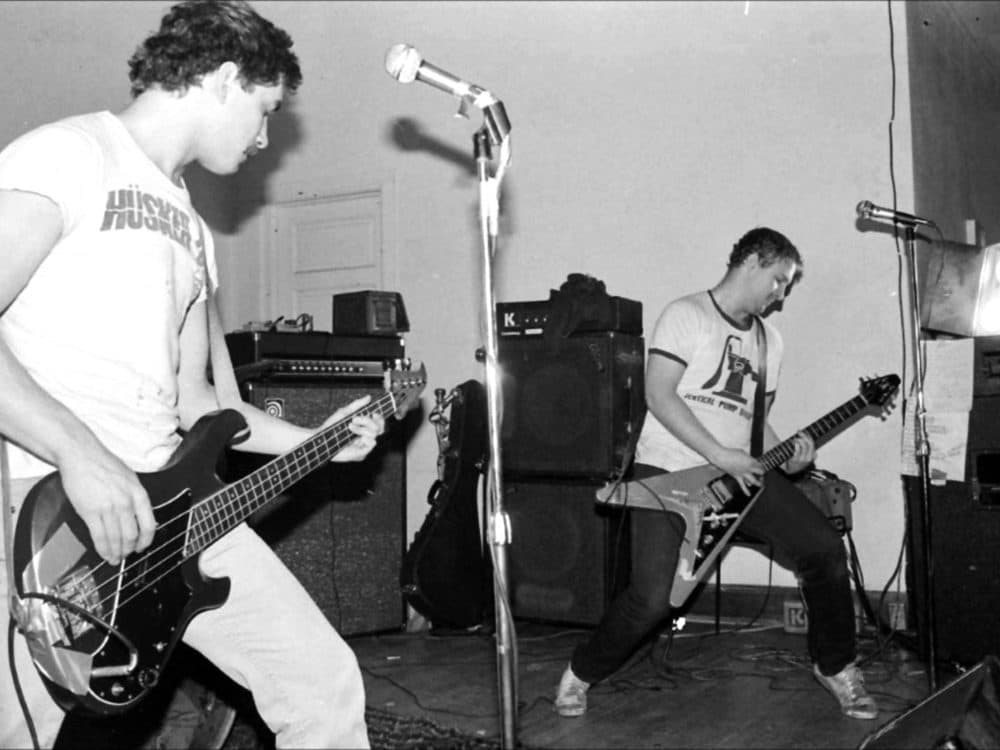Advertisement
Commentary
I've Listened To Loud Rock Music All My Life. Now My Hearing Is Paying The Price

There's a cliché that I, like many rock fans, have often trotted out: If it's too loud, you're too old. It used to be a generational boast (and diss), the rock fan’s version of a red badge of courage. Maybe it’s not so funny anymore. Now, I wince when I hear it.
Last month, I saw electric guitarist-singer Bob Mould blow down the doors at the Paradise in Boston. The rock ‘n’ roll equivalent of a jet engine taking off, the sound tearing through every part of your body.
I’d seen Mould numerous times, dating back to his band, Husker Du. He’s always in a trio setting, with a bassist and drummer aboard. Mould has ear damage — tinnitus at the least — and his game has always been maximum volume rock ‘n’ roll. I always come prepared, with custom-made ear plugs that filter highs and lows equally. Protective preparation be damned, they played for 75 minutes and my ears rang for days.
Long ago, Neil Young wrote a song about heroin addiction called “The Needle and the Damage Done.” Call this piece “The Music and the Damage Done.”
If you’ve played in bands or seen lots of rock shows, chances are this may be your life, one that has, however unwittingly, resulted in ear damage.
The brain processes the music — releases those endorphins when it’s great — but the ear is the conduit. If doing something you love, is killing the enjoyment of what you love, there’s some seriously painful irony going on. There’s a reckoning: Is that journey through the land of mega-decibels the acceptable cost of enjoying what you love?
I’ve been a rock fan since childhood and a professional rock critic since I was 19. The stretch from then to now encompasses four-plus decades and several thousand concerts. Have I been slowly killing the organ from which so much pleasure has been derived?
Years ago, I interviewed The Who’s bassist John Entwistle, after he played a bone-crushingly loud gig with his solo band. The Who has long been considered one of the loudest rock bands; Entwistle’s group was similar. His initial response was the same for every question: “What?” With a repeat of the question, he could mostly follow.
I probably snickered a bit. I know now of where he came.
I have always liked it loud. No, not painfully so, but concert loudness issues were out of my control. I saw Ramones at CBGB in 1977, front row, and it was punk rock nirvana. No pain, exactly, but my ears rang for a week. I considered it a justifiable risk and thought I dodged a figurative bullet. But, eventually, you realize hearing loss doesn’t necessarily happen immediately from one loud blast, but builds up incrementally over time.
And there were many more notable sonic booms over time: Concerts by Motorhead, AC/DC, The Who, Black Sabbath, Swans and Pixies, to name a few.
My audiologist, Megan Ott, says I have “high pitch and high frequency loss in both ears, a sharp drop-off in the 3000-8000 hertz range and a loss of 40-50 dB.”
That damage, she adds, translates into “moderate hearing loss” – difficulty picking up a conversation in a crowded restaurant, trouble hearing speech in certain movies and TV shows and, as my wife can attest, problems with where the female voice is often pitched.
Ott says anything over 85 dB can cause hearing loss. Workout classes at the gym can go over 100 dB, rock concerts can hit 115 dB.
I talked to several ear-damaged musicians about whether it had been worth it and how they coped. Guitarist Roger Miller had to break up his rising post-punk band Mission of Burma in 1983 because of worsening tinnitus. (They got back together in 2002, with Miller wearing rifle range-quality ear protection.)
Miller, also keyboardist with the silent-film scoring Alloy Orchestra, acknowledges what he’s lost but also what he’s gained. He’s 67 and made peace with the tinnitus long ago, reasoning “some part of me knew I had to make a really good rock record and I made that really great rock record with [Burma’s] ‘vs.’ And I pay so much attention to sound, sometimes I transcend my tools. I can listen to a creek and hear how many different sounds are in it.”
Jonathan Kane, co-founder of Swans, has played in dozens of downtown New York groups, including the massed electric guitar ensembles led by Rhys Chatham and the very loud avant-garde minimalist La Monte Young. A 2009 album under his own name is called “Jet Ear Party.”
The 62-year-old has always been a self-professed hard-hitting drummer.
Kane has chronic hearing loss and tinnitus. He professes no regrets — "I lost hearing in the pursuit of playing music that matters to me and I’m proud of that" — but started wearing ear plugs in 1991. “If I had it to do over again,” he says, “maybe I would’ve worn ear plugs earlier. It’s not fun but it becomes a necessity after a while.”
It’s still something many musicians don’t want to talk about, Kane adds, “but I’m way past that. I’d rather function as a PSA for people.”
As for me, not on stage, but out in the crowd, I’d second that emotion. At some point, and I guess that point is now for me, you’ve got to find a balance. Enjoy the music, but bring earplugs to every gig — even if you don’t need them. Recognize that the quality of life — from enjoying a concert to participating in a conversation — is affected by hearing loss. You can’t reverse damage done, but you stop doing that damage.



